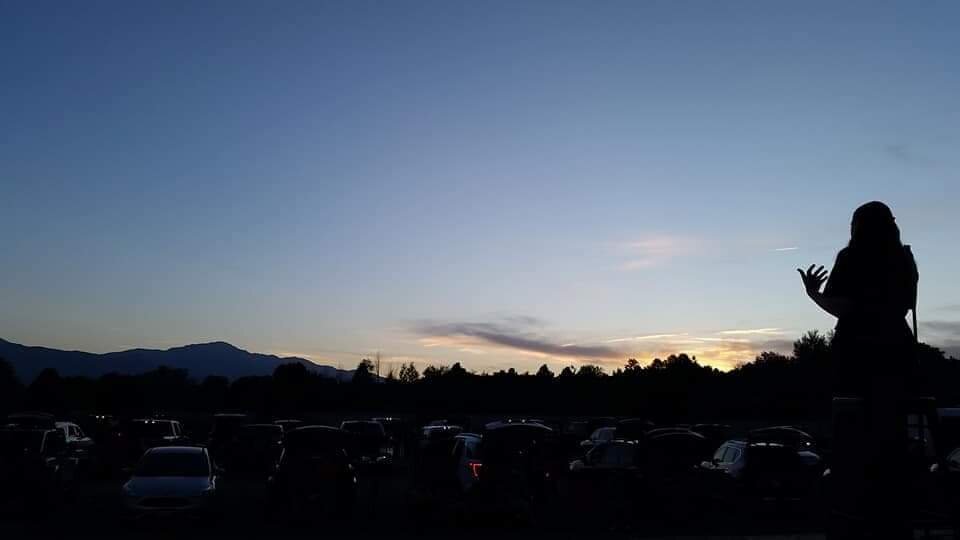It took a whole-ass pandemic for me to face my PTSD
Genevieve Murdick
photo credit: Orion Young
Teletherapy is the only silver lining of this whole-ass pandemic. The shutdown has given me no choice: modernize or be left behind, broken on my bedroom floor. This hot-sounding social worker does breathing exercises with me over the phone. Secretly, I count this as “a date.” I am exactly that lonely. Phone pressed against my face, I deliver him the sales-pitch distillation of the Story of my Shitty Life and Why I Do the Stupid Shit I Do. It’s a story I’d recount again that Friday with the therapist, this time over Zoom: two double-chins suspended over spotty reception. By my second week in therapy, I’d condensed a lifetime of trauma down to an elevator pitch. Blurb on the back of a book. The fact-checked melodrama of a well-crafted Wikipedia page. I get less than an hour to make each new person understand: the social worker, the therapist, the psychiatrist.
It's exhausting in the same way that dating is exhausting. Here’s my super hero origin story. I can break up thirty years into separate acts and phases, like that time Van Gogh painted everything blue. I tell them I’m the kind of girl who will finish making sandwiches while my man loads his gun at the table, while he asks which bullet should he use for me and which one should he then use on himself. If I move quick enough, I can take the gun from his hands, hide the bullets in a separate room, and make it back to the frying pan before the grilled cheese burns. I maladapt and can footnote all the reasons why. It’s not a story I tell chronologically.
I’ve had PTSD since I was four. For me, the Passage of Time has always felt more like one simultaneous clap. The mind time-travels against its will, and suddenly, I am a child: buckled-in and silent in the passenger seat of a Toyota Tercel, the kidnapper in the driver's seat, and my sister squished between us. I do not cry or make things worse. I’m not the baby people think I am. I’m exactly the person that I am now, almost thirty and still navigating my life with the same survival skills that got us home alive that night, even when those skills don’t apply, which is ninety-nine percent of the time. The kidnapper made us tell him what our address was, and after that, we were his bitches, a word that he defined for us. Bitches: it means he knows where we live, and he can come and kill us any time he wants. He never got caught. There was never a line-up, never a trial, never a conclusion to his promise of death-at-any-moment, and each year I remember fewer details of his face.
To make these strangers on the phone understand me, I have to make them understand the gravity of this Cliffhanger. It’s the only way to make them understand the rest. The last appointment is always the psychiatrist. She’s like the Boss Monster of mental health professionals, and by then, I’ve got my trauma boiled down to Cliff Notes. I’ve got my lovers down to bullet-points: how I fell in love with a private investigator in New Orleans—or more accurately, I had been sleeping rough, and so I fell into his bed. I take them to the night I left him, jumping out the first-story window of his side of a shotgun duplex, then climbing bare-foot over two fences, only to find myself landed in the middle of a crawfish boil. Word would spread that the attendees had never seen a girl go from crying to smiling so fast as I did that night. Who doesn’t love crawfish boils?
After that I had no home, and so then I have to explain those years in Alabama, looking after Mama through the cancer, through the staph. I’d been told what I was doing was hospice work. I pre-grieved her in advance, but by some miracle, she went into remission. I could go now. That’s the only way I can explain why I dropped out of grad school, why I find solace in setting my life on fire, and why I moved to Colorado right before a fucking pandemic. How easy it was to just erase who I’d been and take a driver’s license picture that looked like nobody I recognized. I can see the mountains from my bedroom window now, but I’ve only been to the mountains one time.
My therapist tells me that dating will be easy for me here, because I have a Southern accent, and it’s true. I catch rock climbing instructors on Bumble like I’m flypaper, but I just can’t pull the trigger. They never want to meet at this specific public park where I’ve already memorized all possible exits, where I already know which branches could be brandished as weapons if I needed them. Now that all the bars are closed, everybody just wants me to get in a car with them, go for a drive.
I stay home. So fortified, I keep my castle. So deep is the moat that surrounds me. It’s a story I tell over and again, over the phone and over Zoom, and I don’t even have to get out of bed. The screen on my bedroom window is supposed to keep the flies out, but somehow, this one big fly got through. Now it buzzes and it bumps against the screen but cannot penetrate it. I think flies find a way inside when they are small enough to fit through the spaces in the grid, and then they grow up so quickly that before they know what’s happened to them, their bodies are too big to fit back through. Their bodies get so big that they make noise.
Genevieve Murdick is a comedian and performance poet in Denver, originally from Mobile, Alabama and New Orleans. She hosts and produces So, What’d I Miss, the podcast where we watch series finales of TV shows we’ve never seen before. Her novella, Nice Evening Problems (by Chacha Murdick) can be found on the Amazon Kindle app. As a graduate assistant for the Stokes Center of Creative Writing, Genevieve promoted events with famous guest authors and was a founding member and editor of Mobile Canon literary zine. She also runs interviews on her Enter the Baggage Claim podcast series, where she uses story-telling and field recordings to promote the shit out of other artists. Follow her on twitter @SWDIMpodcast.


